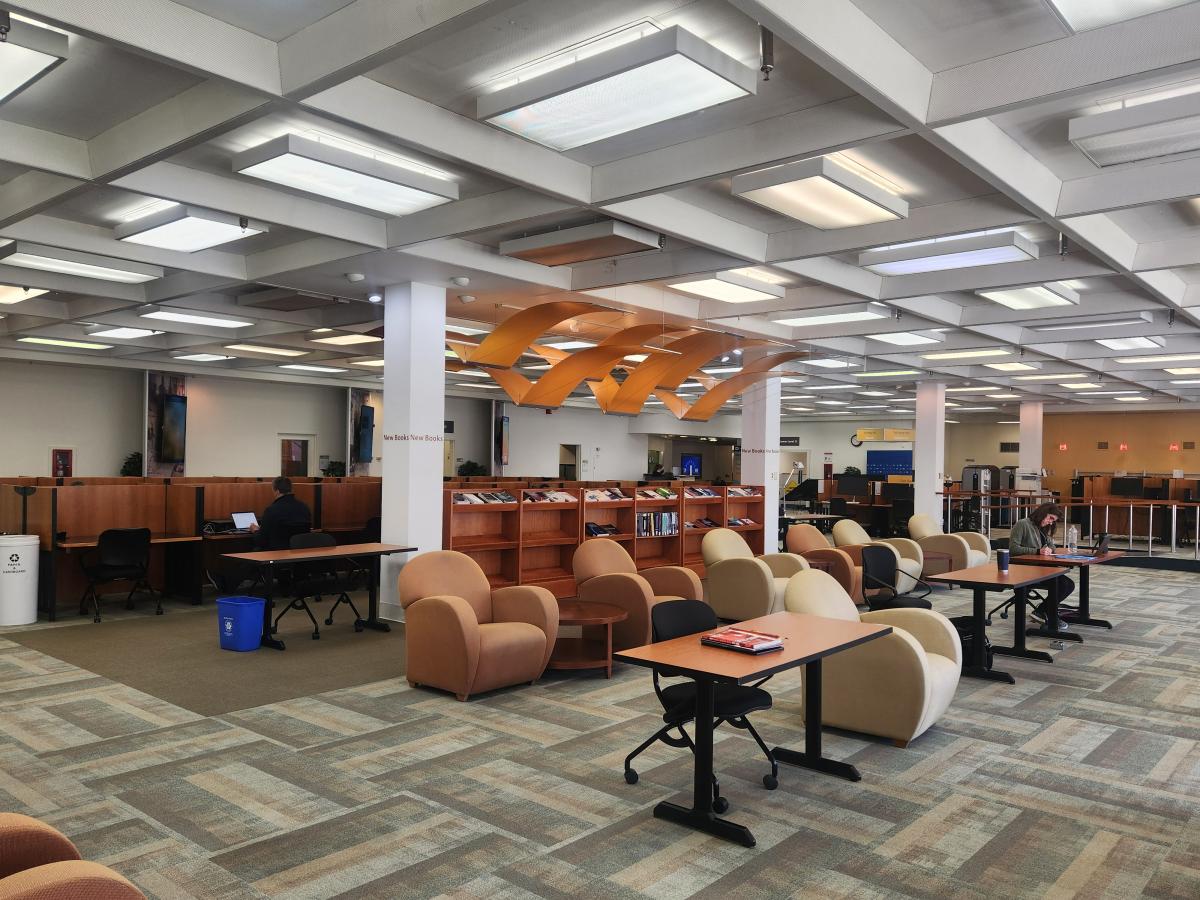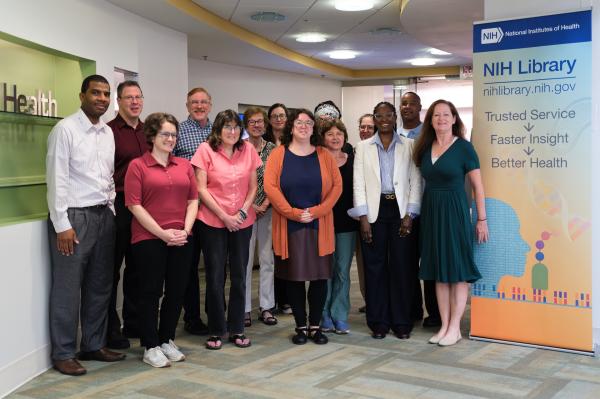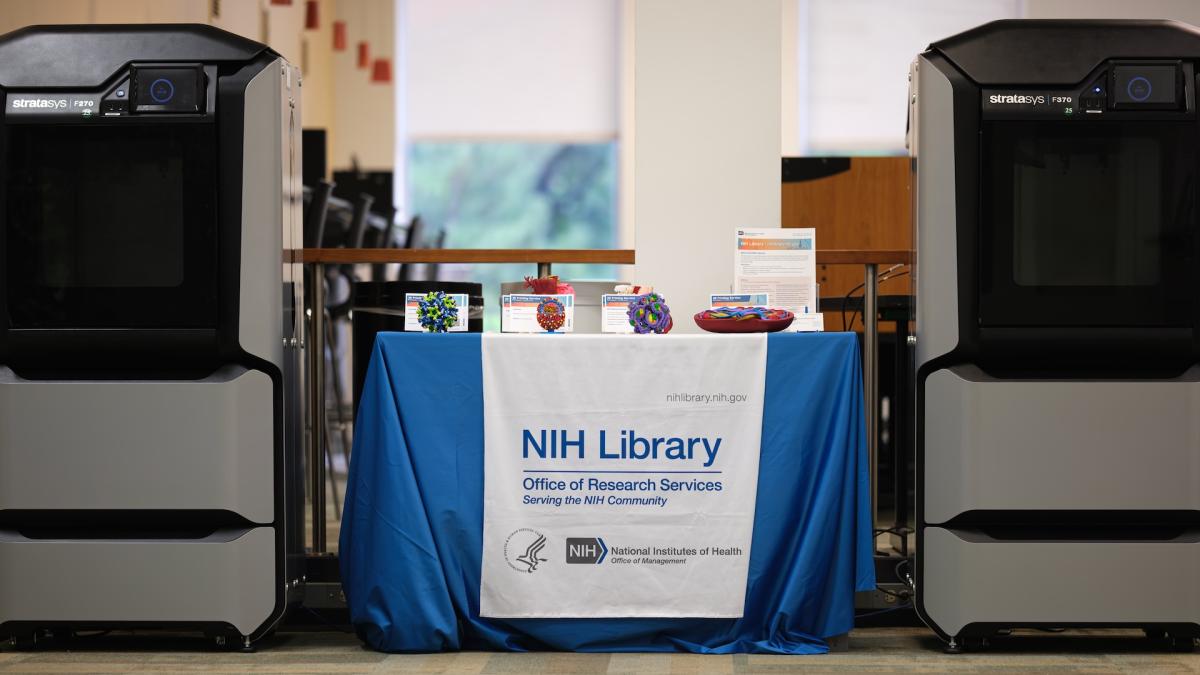News You Can Use
Your Research Partner: The NIH Library
BY YOLANDA JONES, NIH LIBRARY, AND THE NIH CATALYST STAFF

CREDIT: JASPER SHIDE, NINDS
Workspace aplenty: Stroll into the library and settle into a semiprivate cubby or study carrel, or join your colleagues in the open library spaces.
Need information expertise for your next project? Why not turn to the NIH Library? Far more than just a quiet place to read, the NIH Library is an indispensable partner in your research journey. The dedicated staff can connect you with the precise resources and specialized services you need to succeed, from the initial stages of a project to its final publication or application.
Services that you might not know about include data management and analysis, clinical protocol translations, literature searches, document delivery, systematic review consultations, software for formatting references, editing services, emerging technologies such as artificial intelligence training and 3D printing, and even a recording studio.
Most of the library’s offerings can be used remotely, but you are free to visit, too, and make use of its expansive and sunny first-floor reading area or the private cubbies in the floor below. This library is a gem on the south side of Building 10 that opened with the Clinical Center itself in 1953—not to be confused with the NIH’s National Library of Medicine, which is great in its own right but on the other side of “town” in Buildings 38 and 38A.
Where to start?
Your NIH badge is your key to the vast digital collection of premium e-journals, eBooks, and online databases. This incredible wealth of information is available on your NIH devices, providing access to the latest research from around the globe without the need for expensive subscriptions. Whether you are searching for a foundational paper, a newly published clinical study, or an in-depth review of a topic, the library’s online resources ensure you can find what you need, when you need it.

CREDIT: JASPER SHIDE, NINDS
The NIH Library staff stand ready to serve you and your research needs.
Unlike a simple web search, the NIH Library provides access to powerful specialized tools such as Web of Science, Scopus, and Embase, which allow for in-depth data searching and citation analysis. These resources are essential for comprehensive literature reviews and for demonstrating the impact of your research.
The library’s true value lies in its staff’s deep expertise and the specialized services they provide. These services are designed to support every phase of the research life cycle. For example, its experts offer comprehensive literature searches to help you understand the landscape of your field before you even begin, and they can provide essential systematic review consultations to ensure your work meets the highest standards of scientific rigor.
As your research progresses, the library is a resource for managing and analyzing your findings. Staff have extensive experience in data management and analysis, helping you organize and interpret your data effectively.
Looking to learn something new?
The NIH Library offers a wide range of training classes to help you with your research, from data science and bioinformatics to writing and publishing. The workshops can help you master tools like SAS and MATLAB software and even teach you how to use artificial intelligence chatbots effectively.
Beyond this, the library offers on-demand tutorials that allow you to pace your learning and schedule viewing on your own time. The tutorials and subsequent consultations are a great way to supplement learning. Topics range from using bibliometric methods to demonstrate the value of your research to instructions on how to cite data.
What your colleagues are saying
Don’t just take our word. Testimonials are almost as numerous as the articles in its databases.
“The NIH Library has been an important partner in several bibliometric studies I’ve worked on,” said Peter Kilmarx, acting director of the NIH Fogarty International Center. “While my co-authors and I performed the hands-on analyses, the library staff served as consultants, offering expert guidance on bibliometric data sources, search strategies, and methodological approaches. Their support helped strengthen the design and rigor of [several] studies. The quality of their service has been consistently excellent—responsive, knowledgeable, and collaborative. Their insight has added real value to our work.”
The NIH Library publishes a monthly calendar of events.
“I originally took the 3D printing orientation from the library almost 10 years ago,” said John Ball, a staff scientist in the NEI Retinal Neurophysiology Section. “I started my own journey printing models from 3D-reconstructed neurons and designing my own 3D models. I like to use the library’s printers to quickly prototype devices for use in the lab, like custom microscope mounts for samples that use nonstandard plates. I can be more creative with experiment and equipment design than if I’m stuck with off-the-shelf parts or those designed by a company. I can recognize a need, design a component, and have it printed all in two or three days. It’s an amazing service to have access to, and the library staff that run that service and maintain the printers have always been phenomenal to work with. I consider it an essential service for my research.”
How to connect with your information partner
The NIH Library is easy to get to with your fingers or voice, at https://www.nihlibrary.nih.gov, or with feet or scooter near the south entrance of Building 10. Online, the Find Your Librarian service offers a direct connection to the information professional who specifically services your institute, center, or office. This dedicated librarian becomes your go-to partner, learning the unique needs of your research area to provide the most relevant and targeted support possible.
Also, you can always Ask a Question through the website, and the library staff will respond promptly to get you the answers you need.
Ultimately, the NIH Library is a living resource, ready to adapt and grow to meet the evolving needs of the NIH community and ready to partner with you on your next discovery.

CREDIT: JASPER SHIDE, NINDS
The NIH Library offers A-Z 3D printing services.
This page was last updated on Friday, September 5, 2025
